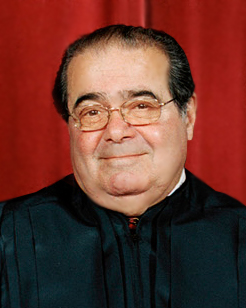 |
| Supreme Court Justice Antonin Scalia (1936 - 2016) |
1. On the absurdity of the Supreme Court being moral arbiters for the nation:
On the evolving-standards hypothesis, the only legitimate function of this Court is to identify a moral consensus of the American people. By what conceivable warrant can nine lawyers presume to be the authoritative conscience of the Nation?[1]
2. On God as the authority for law and government:
[T]he message [the Texas Ten Commandments monument] sends is that law and our institutions come from God.[2]
3. On the fallacy of deferring to international law:
[International law] doesn’t show what the Constitution originally meant, and it doesn’t show what is fundamentally important to Americans today. It shows what’s fundamentally important to somebody else today.[3]
4. On the absurdity of deferring to the "world community"
[I]rrelevant are the practices of the “world community,” whose notions of justice are (thankfully) not always those of our people.[4]
5. On how restricting liberty can be legitimate, and Constitutional:
[The Texas anti-sodomy statute] undoubtedly imposes constraints on liberty. So do laws prohibiting prostitution, recreational use of heroin, and, for that matter, working more than 60 hours per week in a bakery. ... The Fourteenth Amendment expressly allows States to deprive their citizens of “liberty,” so long as “due process of law” is provided:
“No state shall … deprive any person of life, liberty, or property, without due process of law.” Amdt. 14 (emphasis added) [5]
6. On the Supreme Court's legalization of "same sex marriage":
The opinion is couched in a style that is as pretentious as its content is egotistic. If, even as the price to be paid for a fifth vote, I ever joined an opinion for the Court that began: 'The Constitution promises liberty to all within its reach, a liberty that includes certain specific rights that allow persons, within a lawful realm, to define and express their identity,' I would hide my head in a bag. The Supreme Court of the United States has descended from the disciplined legal reasoning of John Marshall and Joseph Story to the mystical aphorisms of the fortune cookie.[6]
Words do have a limited range of meaning, and no interpretation that goes beyond that range is permissible.[7]
Notes
_____________________________________________
[1] Bruce Allen Murphy, Scalia: A Court of One (New York, NY: Simon and Schuster, 2015), 316.
[2] Peter Irons, The Steps to the Supreme Court: A Guided Tour of the American Legal System (Hobokon, NJ: John Wiley & Sons, 2012), 181. Scalia also said:
[The Ten Commandments monument is] a symbol of the fact that government derives its authority from God. And that is, it seems to me, an appropriate symbol to be on state grounds. (Ibid., 180).
[3] "Justices argue international law," Washington Times (April 24, 2005). Retrieved February 15, 2016, from http://www.washingtontimes.com/news/2005/apr/24/20050424-112055-5829r/?page=all
[4] Kevin A. Ring, Scalia Dissents: Writings of the Supreme Court's Wittiest, Most Outspoken Justice (Washington, D.C.: Regnery Publishing, 2004), 158.
[5] Ibid., 288.
[6] Leada Gore, "7 best lines from SCOTUS Justice Antonin Scalia's same-sex marriage dissent," al.com. Retrieved Febuary 15, 2016, from http://www.al.com/opinion/index.ssf/2015/06/7_best_lines_from_justice_anto.html
[7] Antonin Scalia, A Matter of Interpretation: Federal Courts and the Law, ed., Amy Gutmann (Princeton, NJ: Princeton University Press, 1997), viii.

No comments:
Post a Comment